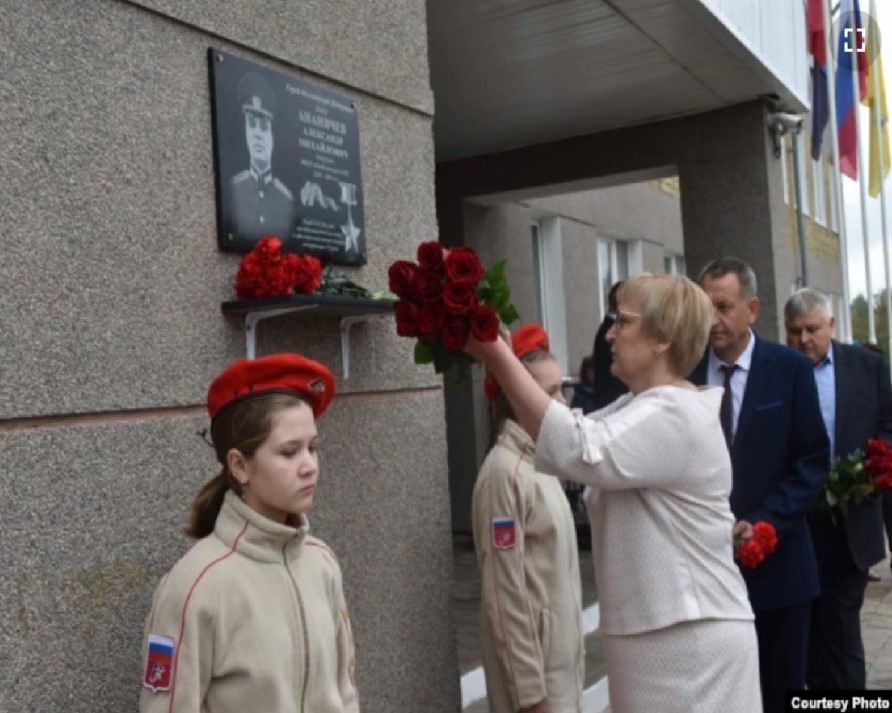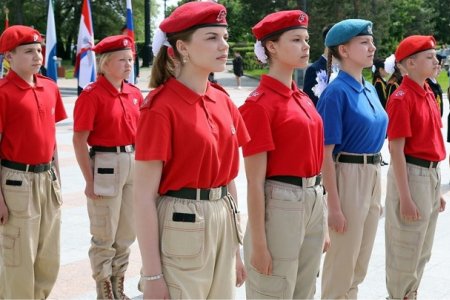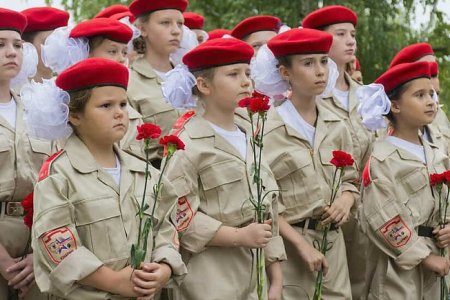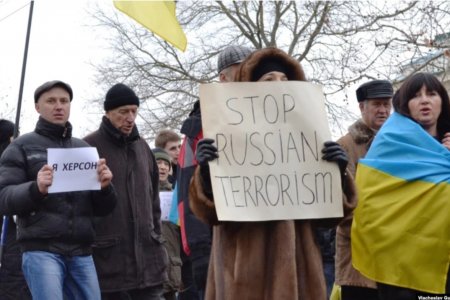
Residents of occupied territory in Donetsk and Luhansk oblasts are reporting an alarming shift in Russia’s pushing of its so-called ‘Yunarmia’ or Youth Army. If this militaristic organization was often treated as an opportunity for kids to take part in exciting games, and maybe even travel to competitions in Russia, over the past year Yunarmia has obviously become a platform for preparing new cannon fodder. Donbas Realities was told that former Yunarmia members have already been killed after signing contracts to fight in the Russian army. As one of the residents said, “it is our children who could be the next ones that Russia calls on to fight”.
None of this can be called unexpected. Human rights groups have long warned of the real aims behind Russia’s aggressive militarization of childhood on occupied territory, and especially its use of militaristic organizations like Yunarmia. Vast amounts of money are being expended on propaganda aimed at glorifying war, justifying Russia’s aggression against Ukraine and, essentially, convincing children and young adults that they should want to ‘defend Russia’ and that Ukraine and its partners are ‘the enemy’. In occupied Crimea, such methods have been accompanied since 2014 by propaganda of military service and active efforts to push recruitment into the Russian army.
Russia began rounding up all men, regardless of age or state of health, in its proxy ‘Donetsk and Luhansk people’s republics’ [D-LPR, or occupied Donbas] at the beginning of its full-scale invasion of Ukraine. Men were sent to the front without any training, and used, essentially, as cannon fodder. The Russian military clearly preferred to send Ukrainians to die, as their deaths were not recorded and no relatives needed to be paid compensation.
The Kremlin’s plans for a “victory within three days” went wrong, and over two years later, Russia’s war machine needs new men to fight its war against Ukraine, and is turning to Yunarmia ‘recruits’.
Donbas Realities was told by the Luhansk mother of a boy in the tenth grade, referred to as ‘Yekaterina’, that parents had been warned on the eve of the new school year that kids from all senior classes must ‘join’ Yunarmia. Any parent objecting to this must write an official statement to the school administration. For the same reason that none of the residents’ real names are given, no one was willing to risk potential consequences by writing such a statement. “Among ourselves we all say that this is wrong. We understand that our children may be the next whom Russia “calls on to fight” How this summer they hunted out senior school and higher institute students to get them to sign contracts and join the Russian army. And here, they’re preparing them from school.”
She adds that senior classes have faced active military propaganda since the beginning of Russia’s full-scale invasion of Ukraine, with meetings organized with Russian fighters; demonstrations in support of what the kids must call by Russia’s euphemistic ‘special military operation’; etc.
While most attention has been focused on the distortion of ‘history’ that children on occupied territory are being foisted, it is clear from Yekaterina’s account that the propaganda is even more widespread. Instead of writing essays in Russian lessons, for example, students are forced to write letters to supposed ‘heroes’, i.e. those fighting Russia’s war, with the teachers prompting phrases like “thanks to you I can study” and similar. The kids are being zombified “in the style ‘everything Russian is worthy, all else is shit”, she says.
‘Serhiy Ihorevych’ from occupied Horlivka (Donetsk oblast) has a granddaughter who joined Yunarmia where the kids learn martial arts, to shoot, to get through obstacle courses and even use drones. All of this is likely to be fun for kids and Serhiy Ihorevych stresses that this was how it was treated by them, with virtually none seeing this as a future career. “Until this year.” He says that Yunarmia is getting a lot of attention specifically as a way of getting future replacements for the Russian army. A lot of new activities are added, with kids learning about types of modern weapons, as well as practical skills in tactical medicine and drone reconnaissance. His granddaughter has obviously swallowed much of the propaganda, as, presumably, did those former Yunarmia members who signed contracts to join Russia’s army, including some who were killed. Most disturbingly, Serhiy Ihorevych says that the kids are encouraged to see even death as part of the times, being told that they can either die fighting for Russia, or be killed, supposedly, “when the Ukrainians come.”
Other parents confirm that the situation has changed since February 2024. Now those joining Yunarmia are very actively prepared “to serve in the Russian Federation armed forces”.
The Yunarmia website was hacked in June 2024, with a video posted of Russian soldiers who were killed fighting in Ukraine. The caption read: “Today your children are in Yunarmia, tomorrow – [buried] in Ukrainian soil.” This led to Russia removing any mention of Yunarmia members who had been killed fighting. Prior to this, the site had shown over one hundred names, including some from occupied territory.
Russian HitlerJugend with a difference
Although the first mention of Yunarmia came in January 2016, the media first noticed it in May after an official gathering of members from all over the country with the participation of the then defence minister Sergei Shoigu, He promised young ‘Yunamia’ members vivid experiences, plane journeys, parachute jumping and going on military submarines. They would be able to shoot from anything except rockets, and travel on all forms of transport. In short, all the things that kids, especially those from more provincial places would find exciting. It was officially registered in August 2016 with Russia’s defence ministry stating that it had emerged “at the initiative” of Shoigu and with the support of Russian leader Vladimir Putin.
There was a strong ideological element to Yunarmia from the outset, with this one of several reasons why the organization was frequently likened to the Nazis’ HitlerJugend.
There was and remains, however, one major difference since Russia is foisting this militarized organization on occupied parts of Ukraine. Any such militarization of childhood is a war crime, and one with a genocidal aim since, together with foisting its ‘Russian world’ ideology, Russia is seeking to eradicate Ukrainian identity. It is not only trying to persuade Ukrainian children that they are ‘Russian’ but that they should want to ‘defend’ the country which invaded Ukraine.
By April 2024, Russia was known to have ‘enlisted’ over 35 thousand children and teenagers from occupied Ukraine into Yunarmia. Even then it was clear that this figure was likely to be an underestimate, and that membership was likely to be ‘voluntary’ in name alone. Now, it would seem, all pretence that this is a voluntary movement has been dropped.
While clear that Russia has not necessarily achieved the mass indoctrination in occupied territory that it was seeking, the danger of such virulent propaganda and warmongering, especially among children, cannot be understated. In occupied Crimea and Donbas, there will be children who have heard from pre-school years that the invaders are ‘heroes’, that they themselves are ‘Russian’ and that it is their ‘sacred duty’ to fight and perhaps die for Russia. It is precisely because of the efficacy of such indoctrination that Russia has sought to gain control of both schools and the media after seizing any Ukrainian territory,
See also:
Ukrainian children brainwashed in Russia’s ‘Youth Army’ into wanting to fight against Ukraine



